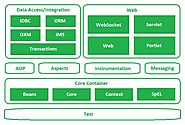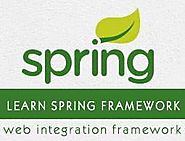-
About
- About Listly
- Community & Support
- Howto
- Chrome Extension
- Bookmarklet
- WordPress Plugin
- Listly Premium
- Privacy
- Terms
- DMCA Copyright
- © 2010-2025 Boomy Labs


 Tech Geek
Tech Geek
Listly by Tech Geek
Spring framework serves as a life protector in cases where the tasks that are supposed to be done manually by the developer. Learn more about the enterprise advantages of Spring framework.

Java has consistently been the most preferred programming language in the tech space. Developers utilize a range of Java tools, libraries, and frameworks to build powerful enterprise solutions. These tools and frameworks can be used in a variety of use cases such as application development, game programming, and back-end development. There are many different Java frameworks available in the market including Hibernate, Apache Struts, and Spring MVC among others.Spring MVC is one of the widely used open-source Java frameworks that offer extensive infrastructure support to create robust Java web applications. It provides a solid foundation for enterprise-grade application development and its structure guides developers throughout the entire app development process. It helps in consolidating your application in a consistent, productive manner, combining the best of all single-tier frameworks.Spring framework comes with a ton of features such as dependency injection (DI), robust authentication, aspect-oriented programming support, inversion of control (IOC) container, transaction management, integration with Hibernate, JSO and iBATIS, and more. Though the popularity of Spring has gradually decreased in the past few years, it is still used for building complex projects in many large organizations like Oracle, Atlassian, Google, LinkedIn, and eBay. In addition to that, both amateur as well as experienced Java programmers can easily learn and use the framework to create Spring-based applications. Being an Oracle certified Java software company in India, we have outlined seven reasons that explain why Spring MVC framework should be adopted for building Java based applications.10 Reasons To Use Spring Framework For Java Application Development:1. Lightweight:Spring MVC simplifies Java enterprise app development by providing enterprise level services. It is a lightweight framework when it comes to size and transparency. The processing overhead is also negligible when using the Spring MVC framework services.2. Modularity:Being a layered framework, Spring MVC includes various modules such as DAO, AOP, JEE, ORM, and more. These modules enable seamless integration with several other frameworks including Hibernate, Apache Struts, JSF, etc. This modularity provides developers the flexibility to work with a module of their choice.3. Web MVC Framework:A web MVC framework comes integrated into Spring which makes it easier to write web MVC applications in Java. The framework is highly configurable through strategy interfaces. It supports integration with multiple view technologies such as Velocity, JSP, iText, Tiles, and POI.4. JDBC Abstraction Framework:The JDBC abstraction layer in Spring framework simplifies DAO implementation through JDBC by providing an inbuilt solution for issues like code duplication, resource and exception handling wherein it converts the SQLException into meaningful exception hierarchy, making error handling strategy easier.5. Inversion of Control (IOC) Container:Inversion of Control (IOC) is at the core of Spring framework. It can be best translated and understood through the term “Hollywood Principle” which means "Don't call me, I'll call you." In the traditional method, usually, the application code is responsible for the flow of control and calling out for class libraries. But in the case of Inversion of Control, Spring framework invokes an application code and coordinates the workflow.6. Aspect-Oriented Programming:The aspect-oriented programming (AOP) model in Spring applies services such as transaction management to POJOs (Plain Old Java Object) without having any need to implement APIs. It further provides declarative enterprise services as POJOs can be easily implemented without affecting your business code.7. POJO Programming:Spring MVC allows the developers to build enterprise Java applications using POJO (Plain Old Java Object) programming. The main advantage of building application using POJO is that developers do not require an enterprise container such an application server. Instead, they have an option to use a robust servlet container.8. Transaction Management:Spring MVC includes a unified abstraction layer for accessing transaction services from various different environments such as Hibernate, JTA, JDBC, and JPA. It also offers support for declarative transaction service similar to Java EE, and EJB.9. Integration with Data Access Technologies:Spring framework provides developers the easiest way to integrate their application with data access services such as Hibernate, JSO, JPA, and iBATIS.10. Spring Remoting:The Spring framework also offers support for integrating different remoting technologies such as RMI, Burlap, Hessian, and JAX-RPC. This additionally includes its own remoting service to suit few architectures.In conclusion, the Spring MVC framework is a stable, high-quality platform backed by Java EE platforms such as Oracle OC4J, IBM WebSphere, and BEA Weblogic. As mentioned earlier, several large organizations still deploy Spring framework for developing mission-critical application due to its flexibility and independence offered in terms of seamless integration, easy migration, improved application performance.Have you built any mission-critical application for your enterprise using Spring framework? Share your thoughts with us using the comment box below.

The Spring Framework is an application framework and inversion of control container for the Java platform. The framework's core features can be used by any Java application, but there are extensions for building web applications on top of the Java EE platform. Although the framework does not impose any specific programming model, it has become popular in the Java community as an alternative to, replacement for, or even addition to the Enterprise JavaBeans (EJB) model. The Spring Framework is open source.

Spring framework Architecture. 1. Core Container 2. Data Access/Integration 3. Web 4. Aspect Oriented Programming and Instrumentation 5. Messaging 6. Test

Spring is frame work for multiple application development, it provides bunch classes which is internally used the J2EE supplied classes, So we can say spring is alternate to struts but complement to j2ee,

Get a breakdown of seven of the most popular Java frameworks, from Spring MVC to Grails. See where each shines and where the fall flat.

Spring Framework Overview - Learn Java Spring Framework version 4.1.6 starting from environment setup, inversion of control (IoC), dependency injection, bean scopes, bean life cycle, inner beans, autowiring, different modules, aspect oriented programming (AOP), database access (JDBC), Transaction Management, Web MVC framework, Web Flow, Exception handling, EJB integration and Sending email etc.
